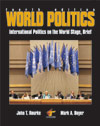"All the world's a stage, and all the men and women merely players," William Shakespeare (1564-1616) wrote in As You Like It. The Bard of Avon was a wise political commentator as well as a literary giant (Alulis & Sullivan, 1996). Shakespeare's lines are used here because they help convey the drama of world politics. The characters are different, of course, with Canada, China, Germany, Japan, Russia, and the United States replacing those of his time and imagination. Beyond that, though, there are remarkable parallels between international relations and the master's plays. Both are cosmic and complex. The characters are sometimes heroic; at other times they are petty. The
action is always dramatic and often tragic. As with any good play, the audience was drawn into the action at The Globe, the London theater where Shakespeare staged his works. Similarly, the global theater of international politics draws us in. Indeed, we are seated on the stage, no matter how remote the action may seem or how much we may want to ignore it. Like it or not, we and the world are stuck with each other. The progress of the play, whether it continues its long run or closes early, is something we will all
enjoy or endure. Another quotation from Shakespeare--this time from Macbeth--is also worth pondering. Macbeth despairs that life "struts and frets his hour upon the stage" in a tale "full of sound and fury." Again the playwright hits the mark! The global drama has a cast of national actors (countries) that are often at odds with one another. It is true that many examples of cooperation and humanity can be found in them. But they are also full of ambition, self-serving righteousness, and greed, and it is a rare day when some of the countries are not in open conflict. And even when they are not threatening one another, they are forever calculating what is good for themselves and taking action based on their national interests. |



 2002 McGraw-Hill Higher Education
2002 McGraw-Hill Higher Education